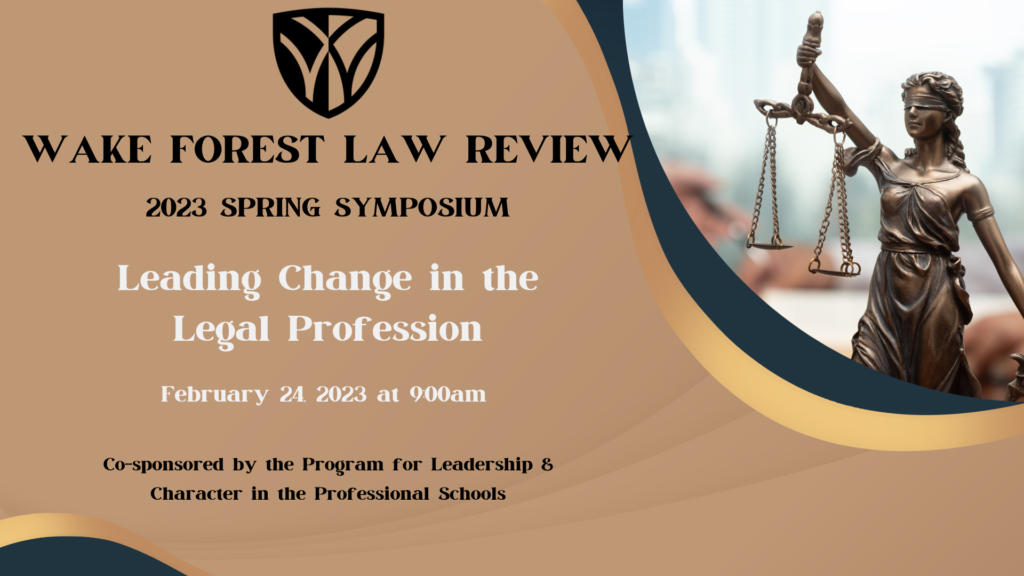
This post is an overdue shout-out to Kenneth Townsend, Director of Leadership and Character in the Professional Schools at Wake Forest University, and his incredible team at Wake Forest School of Law for the fabulous job they did in hosting the Wake Forest Law Review 2023 Spring Symposium: Leading Change in the Legal Profession. Honored to be among the speakers and participants, I want to share some key takeaways.
The symposium was co-sponsored by the Program for Leadership and Character in the Professional Schools, a part of the Wake Forest Program for Leadership and Character. Elevating our leadership language to tie it directly to “character” is brilliant! Discussing aspects of character already permeate our classroom discussion and our Fundamentals of Lawyer Leadership textbook; still, I can and will be more intentional to include references to character formation as an integral part of leadership development.
Kenneth opened the symposium by reminding us of legal education’s challenges, including lack of public trust, poor reputation, lawyers struggling with well-being, disruptions caused by technological advancements, and lack of leadership training. I appreciated his reminder of a book from 30 years ago called The Lost Lawyer: Failing Ideals of the Legal Profession and the 2007 Carnegie Report: Educating Lawyers. Both were pivotal in inspiring my mission to be more intentional about leadership development in law schools these last ten years.
Just a few highlights from the wise words and inspirational messages from the speakers all day long:
During the first panel on experiential education, Holloran Center Fellow Kendall Kerew shared the question posed to Chat GPT: What lawyering cannot be replaced by AI? The answer was:
- Empathy and Emotional Intelligence
- Creativity and Critical Thinking
- Advocacy and Persuasion
- Ethics and Professionalism
- Client Relationship Management
Not only did we find this result interesting, many others did as well when she shared it in a popular blog post on the Holloran Center’s Professional Identity Formation Blog! Another reason why incorporating more leadership development into our legal education programs is so important!
The experiential learning panel also reminded us that best practices for student learning require us to help our students explore their “why” through self-assessment and self-reflection in order to grow. The professional identity panel followed to encourage us to remember Holloran Center Co-Director Neil Hamilton’s mantra to “meet students where they are they are” in order to guide them through reflection, coach them to develop the competencies expected by legal employers, and model and mentor students toward well-being by aligning professional and personal values. Professor Lisle Baker shared practical and clever tips for incorporating well-being practices into classes.
In her keynote address, Judge Eleni Roumel, U.S. Court of Federal Claims, encouraged the students to commit to practicing civility, ethical behavior, and serving the public. And the panel of women stressed the importance of building relationships and seeking mentorships that grow organically.
Dean Mark Martin shared his vision for creating a new law school at High Point University that builds on principles found in the Carnegie report but is updated for the impact of technological advances. These were points of current emphasis:
- Promote diversity & developing strategies to unite us
- Enhancing understanding of new and emerging technology
- Reassessing pedagogy
- Increasing experiential education
- Improve law student wellbeing
- Focus on the unmet legal needs of persons of modest means
- Financing legal education
The program ended with a reminder that when we are at our best when our students are at their best, we are:
- more confident;
- more competent;
- better able to stay committed to values we have internalized; and then
- better able to serve and help others.
Gatherings such as these always energize and inspire me!!
Many thanks again to all of you working to build a better future by enhancing legal education!
– LEAH








